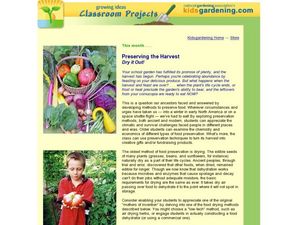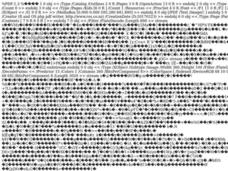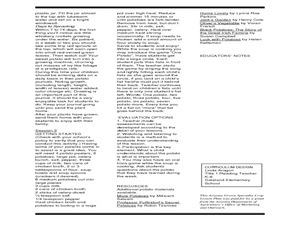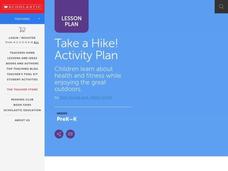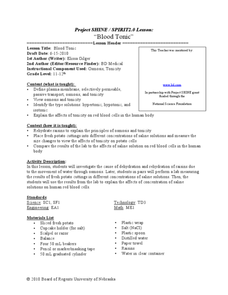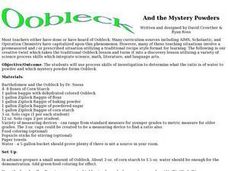Alabama Learning Exchange
Light, Dry and Nutritious - A Look at Dehydrated Food
Fifth graders study dehydration and dehydration of foods. They measure the amount of water lost from fruits as they are dehydrated. They use desktop publishing software to design an advertisement for dehydrated fruit after researching...
Curated OER
Preserving the Harvest: Dry it Out!
Students explore how people preserved their food in the past. In food preservation lesson, students create different models that enable someone to dry out food, such as a food dehydrator. Students also learn how to prepare different...
Curated OER
Astronaut's Favorite Foods
Students examine space food. In this space science lesson, students visit suggested websites to identify the eight categories of space food. Students use a space food nutrition guide to classify space food.
Curated OER
Solar Energy - Dehydration
Sixth graders explore process of drying food using solar energy. They cook and/or dry food such as pumpkins, watermelon, corn, and deer meat, explain how solar energy changes foods, and compare and contrast solar energy with other forms...
Curated OER
Arrays of Food
This instructional activity is based on video clip 220 from the Count on it! series, however the same problem can be posed with out the video. Learners work independently to determine the amount of dried food they will need for a camping...
Curated OER
Farmers and the Food Connection
Students investigate the process of growing food. In this agricultural lesson, students invite a farmer into their classroom to discuss how they grow and process food. Students participate in learning centers which focus on farming.
Curated OER
People and Space
Students explore space travel. In this space science lesson, students define "dehydration" and explain why dehydrated foods are necessary for space survival. Students prepare and eat a meal that includes a variety of dehydrated foods.
Curated OER
From Mashed to Riches
Students discuss the uses of a potato. In this food group lesson, students identify the five food groups and which one the potato belongs to. They create potato printing, compare different kinds of potatoes, grow a potato plant, and more.
Science Friday
Sublime Sublimation
Dry ice isn't dehydrated water, and young scientists learn why in this fascinating presentation. After watching a video, they complete three different activities using dry ice. Upon completion, they discuss the scientific principle.
Curated OER
People and Space
Young scholars eat dehydrated foods that the astronauts would eat in space. In this dehydrated foods lesson plan, students make lists of food they could eat, discuss how dehydration takes place, eat food, and complete discussion questions.
Curated OER
Structural and Behavioral Adaptations
Learners participate in a role playing lab that allows students to experience how different beak adaptations play a role in the type of food the animal can eat, therefore playing a role in the survival of the species.
Curated OER
Water/Hydration
Students develop an understanding of the role water has in the body and the importance of getting enough water each day. Through the lesson, students recognize the risks and signs of dehydration. Also, they identify foods with high...
Curated OER
Take a Hike!
Learners explore the benefits of staying active by going on a hike. In this physical education lesson, students discuss the concept of a hike, where a good place to hike is and what types of foods are necessary to stay nourished....
Curated OER
What's the Matter with My Orange?
Students use oranges to informally explore decomposition, dehydration, fermentation, the water cycle, bacteria, yeast, food webs, the needs of living things, and physical vs. chemical change over a period of three or more months.
Curated OER
Grinding corn in Swaziland
Students participate in grinding corn, a major part of food preparation in rural Swaziland.
Baylor College
Water in Your Body
Do you know how much water you have had in the last 24 hours? Do you know how much your body needs? In this hands-on activity, your class members will estimate how much water our bodies lose each day by filling and emptying one-liter...
Desert Discoveries
Desert Tortoise: Fact or Fiction?
Here is a good game that will determine which team knows the most about the Sonoran Desert tortoise. There are 16 questions posed, and the answers are printed in bold for the benefit of the teacher. Question # 16 reads, "Desert tortoise...
Curated OER
Microbes and Health
Students participate in activities that show them how tiny germs are spread. In this germs lesson plan, students engage in hands on lessons to show them how microorganisms can easily spread disease through the mouth and hands.
Curated OER
Island Survival
Students participate in a simulation of life on a deserted island. They apply their critical thinking skills and knowledge of oceans and islands to "survive" and ultimately return to safety. Lesson contains adaptations for all levels.
Curated OER
Autumn Arrays
Autumn is a time for nature to get ready for the upcoming winter. After listening to the book Time to Sleep about the changes of deciduous trees in the fall, learners monitor a tree on a daily basis and view photos of fall foliage online.
Curated OER
Blood Tonic
Young scholars investigate the process of osmosis using fresh potato cuttings in saline solution. In this biology lesson, students explain the difference between hypertonic, hypotonic, and isotonic solutions. They collect data from the...
Curated OER
Hand Washing: I can handle it!
Students wash cinnamon off of their hands in a variety of ways to learn proper ways to disinfect. In this washing hands lesson plan, students use water, soap, cooking spray, and other ingredients to wash hands and talk about the results.
Curated OER
Oobleck and the Mystery Powders
Pupils listen to the book, "Oobleck," by Dr. Suess before experimenting with mystery powders. They determine the proper ratio of powder to liquid to make the Oobleck.
Curated OER
The Last Great Canal
Pupils read about a cholera outbreak in the 1840's. They read maps, predict how cholera moved throughout the country and participate in a lab activity that demonstrates how disease is spread. They compare cholera through time.



